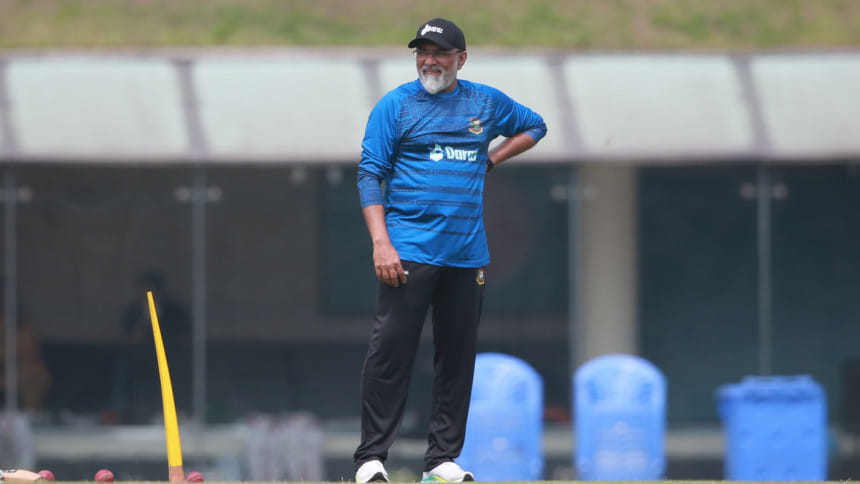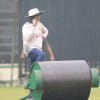'We are on the right path'

Chandika Hathurusingha looks calmer and more composed and appears to have been doing his homework since starting his second stint as Bangladesh's head coach. The Sri Lankan has come with the purpose of transforming Bangladesh cricket with short and long-term planning. The 54-year-old spoke with The Daily Star's Mazhar Uddin about his plans in restructuring the grassroots level, strengthening the pipeline and a few other topics in the first of a two-part interview. The excerpts are below:
DS: After joining for a second term, you spoke about focusing on developing local resources and grassroots. Have you pitched any suggestions to the board about improving the domestic structure?
CH: What I had talked about was having a system in place, for which I had recommended David Moore, who was the general manager of cricket in New South Wales. He joined [BCB as head of programmes] before me and has done some work. We also presented our ideas to the board once. So we are starting the process to create a structure in terms of the Bangla Tigers programme, the High Performance unit and coaching procedures. I think he [Moore] is even focusing on bringing in umpires, coaching mentors and things like that. So, these things are in place but will take some time to implement. However, things that we could have done immediately, we did.
The competition in the National Cricket League (NCL) and Bangladesh Cricket League (BCL) is good because there are eight and four teams in the tournaments respectively.
But a player who plays for one team in the BCL and for a different team in the Dhaka Premier League (DPL) and another team in the Bangladesh Premier League (BPL) does not know which particular team he can call home. In that case, where will he go and train [during off-season]? That's the biggest area we can improve. In Sri Lanka, if I am not in the national squad, I can go to my club and train because that's my home and the same goes for Australia. So, one of the suggestions from David and I was to establish eight centres where players can set up base and practice.
That's a long-term initiative and then in the short term, the players are getting into the national set-up and HP squad. We make sure to give them tactical knowledge and skills development and also an understanding of nutrition, fitness, game awareness and confidence. And then we pick the best of the best and fast-track them closer to the national set-up. We want that system with the HP unit and the Bangla Tigers programme. We can also help that along by enhancing the knowledge of the local coaches, physios and trainers. If the facilities in those centres have proper nets and indoor nets, then they can train without coming to Dhaka.
So then the competition in the NCL will rise and they will understand how to compete and absorb pressure. All that will come with good people around and having competition there. The skill level is there -- that's why they are at that level. The board did a good thing by preparing good wickets. And what was the result? We are getting some good fast bowlers and the batters are playing better against good pacers. I think we are on the right path.
DS: We talk about Bangladesh not having enough players in the pipeline. Have you suggested any plans in order to strengthen the pipeline?
CH: You say there are no players in the pipeline, but I see a lot more in the pipeline waiting for an opportunity. I think there's a lot in the pipeline. I look at the fast-bowling unit and I see about seven or eight players fighting for three or four places. But we can play a maximum of three unless the fourth one is an all-rounder.
And in the batting department, there's competition for spots. Regarding your question, I would love to see a few spinners. I have been crying for a leg-spinner for quite some time. That has been my mantra since 2014-15. That's one area I would love to see. But the fact that Mehedi Hasan Miraz and Taijul Islam have established themselves now makes it very hard for other guys to break through.
There's competition but I am looking for a niche group of players who can actually become world-class. And then the areas where you may say we are lacking are in terms of a leg-spinner and probably a little in terms of all-rounders or fast-bowling all-rounders.
DS: It seems that most of the newcomers who break into the national team are not prepared for international cricket given what they face in domestic competitions and hence have to learn in the international arena. What's your take on that?
CH: In the sub-continent -- apart from India now as their level has gone up -- for the likes of Sri Lanka and for us, it's a big jump from domestic to international cricket. For me, India and Australia are the closest in terms of the gap between domestic and international standards. But for every other country, it is a jump and it takes time.
We need to close this gap and I think that's where we are heading now. I think we are closing the gap because we have a good domestic system in terms of the programmes. We have two four-day competitions, a well-established 50-over competition and we have a good T20 competition in the form of the BPL. So I think we are heading in the right direction. Having good competitions helps. The reason we understand the 50-over game so well is because of the Dhaka Premier League. I don't know if it has been there for more than 50 years. That's why we compete well in this format.
The Daily Star (DS): Compared to your first stint, are there any striking transformations that you have noticed in the current crop of players?
Chandika Hathurusingha (CH): I think the biggest difference that I have noticed is a change in work ethic. Their work ethic has improved. They recognise that high intensity in training is more effective than the volume of training. Especially the ones who were there before [during Hathurusingha's first stint in 2014], they were more proactive this time around – doing their own work instead of waiting for instructions. That's the biggest difference. Their fitness has also improved a lot and the competition for each position has also increased.
DS: What about the new guys?
CH: Some of the young guys who I have not seen like Towhid Hridoy, Shamim Hossain, Afif Hossain, Hasan Mahmud -- these guys know what they are doing. They are very athletic, let's put it that way, they are more complete and very skilful. For instance, fielding has improved a lot [because of the young players].
DS: Have you set any goals for yourself or for Bangladesh?
CH: I am always trying to get the best out of the people that I lead. That's the aim. I like providing the best environment for the players' success. If I can set up that environment, I think that's my satisfaction. It's not about results. The result will take care of itself if I equip them and maximise their potential.
For example, I am bringing people around who have resources. I am not a mental coach, nor am I a psychologist. So I bring them in and get expert support around the players so they can become the best versions of themselves. For me, it's about making that environment and the culture right and making sure they do the right thing for the team.

 For all latest news, follow The Daily Star's Google News channel.
For all latest news, follow The Daily Star's Google News channel. 








Comments